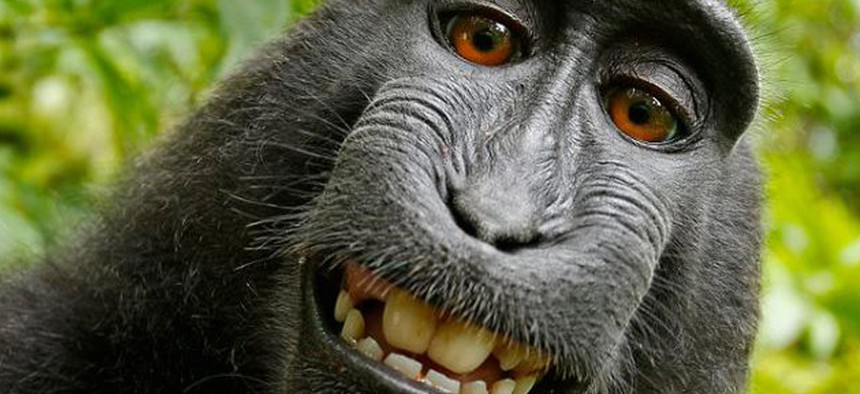
Wikimedia via a Macaca Nigra
Monkeys Can't Get a Copyright
The U.S. Copyright Office includes monkeys on a list of things that do not qualify for copyright protection.
If a monkey takes a selfie, it does not qualify for copyright protection in the U.S., even if the monkey's skills rival those of Kim Kardashian. The same goes for portrait-painting elephants.
In the newest edition of the office's guidelines released Tuesday, the U.S. Copyright Office is crystal-clear that only humans qualify for copyright protection.
"The copyright law only protects 'the fruits of intellectual labor' that 'are founded in the creative powers of the mind,' " the U.S. Copyright Office writes in the first major update to the manual in 30 years. "The Office will not register works produced by nature, animals, or plants."
Ghosts and their brethren are similarly out of luck. "The Office cannot register a work purportedly created by divine or supernatural being," the new update states.
The "human author" requirement is not a new addition, but the animal example is new and relates to the ongoing dispute between Wikimedia, the nonprofit behind Wikipedia, and British photograph David Slater over who owns the rights to a photo taken by an animal.
The dispute dates back to 2011 when Slater's camera was hijacked by a group of impish macaques during visit to Indonesia. The mischievous monkeys took dozens of photos, but one gem emerged: a focused self-portrait of a grinning female monkey.
Wikimedia added the photo to its royalty-free commons, and denied Slater's request to take it down on the grounds that an image taken by an animal is "uncopyrightable."
The Copyright Office deliberately added real-life examples to the new edition with the goal of avoiding confusion, according to Bill Roberts, acting associate register of copyrights and director of the office of public information.
The 2,000-plus-page manual, called the Compendium of U.S. Copyright Office Practices, is not law but rather a set of guidelines the office uses to decide whether to add something to the federal register. It is important because it lifts the veil on how the office makes its decision. The newest update aims to address the changes to copyright in the digital age.







